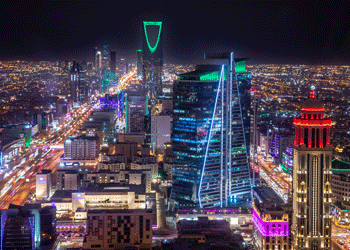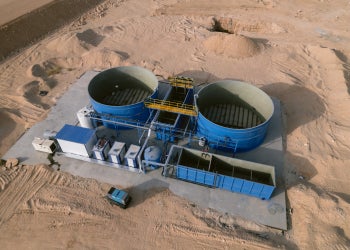Jordan economy holds a steady course
7 June 2023
 MEED's July 2023 report on Jordan also includes:
MEED's July 2023 report on Jordan also includes:
> OIL & GAS: Jordan's oil and gas sector battles sluggish phase
> POWER & WATER: Jordan sustains utility infrastructure progress
> CONSTRUCTION: Hospital boost for Jordan construction
With attention absorbed by the royal wedding of Jordan's Crown Prince Hussein bin Abdullah and Saudi architect Rajwa al-Saif in early June, the release of unemployment figures for the first quarter of 2023 showing joblessness at almost 22 per cent suggested it might have been a good day to bury bad news.
Stubbornly high unemployment is only one challenge facing the Hashemite Kingdom. Rising costs have also roused demonstrations. Last December, professional drivers took to the streets to protest against fuel price rises, a side effect of the imposition of IMF-backed fuel subsidy reforms that resulted in a doubling of prices.
And yet, broader inflationary pressures have been mitigated by significant strategic wheat reserves and long-term gas supply arrangements. The country’s dollar peg has also limited foreign exchange volatility.
Inflation still poses a significant risk, say analysts. “Jordan has been largely shielded from the high inflationary pressures affecting the world. However, the country inevitably faced higher prices as both food and fuel supplies have been affected by Russia’s war on Ukraine,” says Farah el-Rafei, Jordan economist at consultancy Oxford Economics.
“If inflation spikes again, this could put significant pressure on the government, given stagnant wages and high unemployment.”
Institutional acclaim
The government’s economic management has won plaudits from the IMF and ratings agencies. The IMF’s most recent assessment issued in May found that despite a challenging global and regional environment, Jordan has managed to maintain macroeconomic stability and access to international capital markets through prudent monetary and fiscal policies.
The fund lauded the kingdom’s post-pandemic recovery, projecting real GDP growth rise to 2.7 per cent in 2023, and inflation for the year to moderate to 3.8 per cent.
This has afforded space to tackle the country’s indebtedness, with ambitions to reduce public debt to 80 per cent of GDP by 2028, from around 90 per cent now. This will be achieved by continued efforts to broaden the tax base, and by improving the efficiency of public spending.
“The country has made solid progress in implementing the structural reforms suggested by the IMF,” notes El-Rafei.
“Activity has increased via higher tourism and export revenues carried over from 2022, and this momentum is likely to be maintained in 2023.”
If inflation spikes again, this could put significant pressure on the government, given stagnant wages and high unemployment
Farah el-Rafei, Oxford Economics
Persisting difficulties
Despite Jordan’s cushioning against inflation, particularly with food stocks, there is an expectation that rises in prices in the region will inevitably catch up on growth efforts this year.
Another risk stems from the dollar peg, where higher interest rates raise the cost of borrowing.
“While the US Federal Reserve announced a potential end to the rate hikes, leaving the rates as high as they are for an extended period might suffocate investment in Jordan,” says El-Rafei.
Jordan’s external deficit remains high, reflecting the country’s high import burden. The current account deficit widened to 7 per cent of GDP in the first half of 2022. This external deficit is expected to persist in the short term as global inflation stabilises and regional exports and investments pick up.
Though the IMF recommends continuing the prudent policies that have preserved macroeconomic stability, the government may find it increasingly difficult to increase tax revenues and change the composition of tax revenues.
According to Nesreen Barakat, CEO of the Jordan Strategy Forum, total tax revenues are still hovering around 15 to 17 per cent of GDP, and most of these revenues (about 70 per cent) emanate from the country’s sales tax.
“Broadening the tax base is proving difficult,” she says. “In addition, I wonder how the government can improve the efficiency of public spending when a few spending items, such as wages, pensions and interest payments on public debt, account for a large proportion of total public spending.”
Restrategising growth
Another challenge for Jordan is that merely sustaining the post-pandemic recovery may not be enough.
In Barakat’s view, given the unemployment challenge, much stronger real GDP growth rates are needed. “Here, I am not confident that the Jordanian economy can achieve higher growth rates in the next few years,” she says.
“If we succeed in implementing the Economic Modernisation Vision’s initiative and public sector reform, we might have a good chance in the long term. Within this context, one cannot underestimate the importance of enhancing and increasing local investments as well as foreign direct investment.”
The Economic Modernisation Vision calls for the private sector to take the lead, accounting for 73 per cent of the total $58.8bn in investment.
The three-phase vision aims to increase average real income per capita by 3 per cent annually, create 1 million jobs and more than double the nation’s GDP over 10 years.
For the vision to be realised, a large pipeline of public-private partnership (PPP) schemes is needed, covering water desalination, school construction, clean energy, green hydrogen, transport improvement and road construction, among others.
Barakat says the government should not just focus on 'large' PPP projects. “The private sector cannot get involved in large and long-term PPP projects,” she says.
“The absence of an active bond market in its primary and secondary aspects makes it impossible for them (entrepreneurs as well as banks) to get involved. I see the private sector getting involved in 'small' PPP projects. This is where the government should be instrumental in determining these projects and seeking private sector partnerships.”
Green opportunities
Another new avenue of thinking is a greater interest in climate spending.
Last year saw the launch of the government’s Green Economy Financing Facility (GEFF), supported by the European Bank for Reconstruction & Development, the Green Climate Fund and the EU, to help Jordan transition to a green economy.
Some $22m of funding via three GEFF deals has been disbursed to boost private sector investment in renewable energy and efficient utilisation of water and energy resources. The International Finance Corporation has also announced a $50m investment issued by the Jordan Kuwait Bank.
“This is particularly significant as Jordan is considered among the most vulnerable to drought due to climate change, which remains a high risk due to capacity shortages,” says El-Rafei.
Such long-term strategising will be key to developing Jordan’s economic potential. But in the meantime, there are near-term hurdles to navigate amid a challenging international context that is forcing higher borrowing costs. The danger remains that this could choke investment opportunities that are essential to Jordan’s recovery.

Exclusive from Meed
-
 Solar deals signal Saudi Arabia’s energy ambitions
Solar deals signal Saudi Arabia’s energy ambitions13 February 2026
-
 Saudi Arabia appoints new investment minister
Saudi Arabia appoints new investment minister13 February 2026
-
 Indian firm wins major Oman substation contract
Indian firm wins major Oman substation contract12 February 2026
-
 Developers appoint contractor for $500m wastewater treatment project
Developers appoint contractor for $500m wastewater treatment project12 February 2026
-
 Dewa raises Empower stake in $1.41bn deal
Dewa raises Empower stake in $1.41bn deal12 February 2026
All of this is only 1% of what MEED.com has to offer
Subscribe now and unlock all the 153,671 articles on MEED.com
- All the latest news, data, and market intelligence across MENA at your fingerprints
- First-hand updates and inside information on projects, clients and competitors that matter to you
- 20 years' archive of information, data, and news for you to access at your convenience
- Strategize to succeed and minimise risks with timely analysis of current and future market trends

Related Articles
-
 Solar deals signal Saudi Arabia’s energy ambitions
Solar deals signal Saudi Arabia’s energy ambitions13 February 2026
 Commentary
Commentary
Mark Dowdall
Power & water editorSaudi Arabia’s recent agreement to build $2bn-worth of solar power plants in Turkiye is the latest sign that the kingdom’s energy influence is changing.
Historically, this was measured in oil barrels and export volumes. Increasingly, this is extending to capital, structuring expertise and the ability to deliver record-low tariffs in competitive markets.
Announcing the deal, Turkish Energy Minister Alparslan Bayraktar said tariffs for the plants would be the country’s lowest on record, with electricity purchased under 25-year power purchase agreements.
It followed another announcement, in January, that Acwa is investing $200m to build a large-scale solar photovoltaic (PV) plant in the Philippines.
Whether Saudi-backed companies ultimately retain long-term stakes or primarily develop and build the assets, their role at the front end is significant.
Sponsors that bring sovereign backing, clear procurement processes and access to low-cost financing can influence tariffs and contract terms from the outset.
There is also a geopolitical layer. Investing in Turkiye, or anywhere for that matter, strengthens political and economic ties at a time when regional alignments are shifting.
Energy infrastructure is also long-term by its nature. It connects ministries, regulators, lenders and operators in relationships that often extend well beyond a single transaction.
Saudi Arabia has spent the past few years refining its approach to pricing, structuring and financing large-scale renewables at home.
Exporting that expertise may not rival oil in scale or visibility, but it does signal that Saudi Arabia is becoming more than just an energy supplier.
Increasingly, it is becoming a participant in how other countries design and finance their energy transitions. That influence is still significant.
https://image.digitalinsightresearch.in/uploads/NewsArticle/15645903/main.jpg -
 Saudi Arabia appoints new investment minister
Saudi Arabia appoints new investment minister13 February 2026
Register for MEED’s 14-day trial access
King Salman Bin Abdulaziz Al-Saud has made a series of senior government changes, including Khalid Al-Falih leaving his role as investment minister to become minister of state and a member of the cabinet.
Al-Falih has been replaced by Fahad Al-Saif as investment minister. Al-Saif has been head of the Investment Strategy and Economic Insights Division at the Public Investment Fund (PIF) since 2024. That role involved formulating PIF’s long-term investment strategy. He has also served as head of the Global Capital Finance Division, a role he has held since joining PIF in 2021.
The change of investment minister comes at a time when securing investments has become a key priority for Saudi Arabia as it prepares to hand over more projects to the private sector for delivery.
King Salman also named Abdullah Al-Maghlouth as vice-minister of media and Abdulmohsen Al-Mazyad as vice-minister of tourism. Khalid Al-Yousef was named attorney general, and Sheikh Ali Al-Ahaideb will serve as president of the Board of Grievances.
Faihan Al-Sahli was selected as director general of the General Directorate of Investigation, while Abdulaziz Al-Arifi was chosen to lead the National Development Fund. Haytham Al-Ohali will head the Communications, Space and Technology Commission, and Fawaz Al-Sahli will chair the Transport General Authority.
https://image.digitalinsightresearch.in/uploads/NewsArticle/15645415/main.gif -
 Indian firm wins major Oman substation contract
Indian firm wins major Oman substation contract12 February 2026

India’s Larsen & Toubro has won a contract to build the Majan 400/220/132kV grid station in Oman.
Estimated to cost $100m, the project includes an associated 400kV line-in line-out underground cable from Sohar Free Zone to the Sohar Interconnector Station.
The contract was awarded by Oman Electricity Transmission Company (OETC), part of the government-owned Nama Group.
The grid station will comprise eight 400kV gas-insulated switchgear (GIS) bays, eight 220kV GIS bays and 10 132kV GIS bays at the new Sohar Free Zone substation.
The scope includes the installation of two 500MVA, 400/220kV transformers and two 500MVA, 220/132kV transformers.
Local firm Monenco Consulting Engineers was appointed in April last year to provide design and supervision services for the project.
As MEED exclusively revealed, the main contract was tendered in June, as part of three significant contracts to build new substations in the sultanate.
The second contract, worth about $35m, covers the construction of the Sultan Haitham City 132/33kV grid station and associated 132kV line-in line-out underground cables running 4 kilometres from Mabella to Mabella Industrial Zone.
The third contract, valued at about $100m, covers the construction of the Surab 400/33kV grid station and an associated 400kV line-in line-out cable from the Duqm grid station to the Mahout grid station.
Local firms Muscat Engineering Consulting and Hamed Engineering Services are consultants for the Sultan Haitham City and Surab projects, respectively.
The two remaining contracts are currently under bid evaluation, with awards expected this quarter.
https://image.digitalinsightresearch.in/uploads/NewsArticle/15638107/main.jpg -
 Developers appoint contractor for $500m wastewater treatment project
Developers appoint contractor for $500m wastewater treatment project12 February 2026

Register for MEED’s 14-day trial access
Egypt’s Orascom Construction has won the engineering, procurement and construction (EPC) contract for a major wastewater treatment project in Saudi Arabia’s Eastern Province.
A consortium of Saudi utilities provider Marafiq, the regional business of France’s Veolia and Bahrain/Saudi Arabia-based Lamar Holding is developing the $500m (SR1.875bn) industrial wastewater treatment plant (IWWTP) in Jubail Industrial City 2.
Sources close to the project confirmed the appointment to MEED, adding that the project has now entered the construction phase.
Industry sources also said that financial close on the project is expected to be reached in the coming days.
In September, the developer consortium was awarded a contract, under a 30-year concession agreement, by Saudi Aramco Total Refining & Petrochemical Company (Satorp), a joint venture of Saudi Aramco and France’s TotalEnergies.
The planned facility will treat and recycle wastewater from Satorp’s under-construction Amiral chemical derivatives complex, also in Jubail.
Marafiq, formally Power & Water Utility Company for Jubail and Yanbu, will own a 40% stake in the dedicated project company. Veolia Middle East SAS will hold a 35% stake, and Lamar Holding’s Lamar Arabia for Energy will hold the other 25%.
The planned IWWTP, which will primarily serve the $11bn sprawling Amiral chemicals zone, will implement advanced water treatment and recovery technologies to process complex industrial effluents, including spent caustic streams. Treated water will be reintegrated into the industrial processes, supporting closed-loop reuse and energy efficiency.
The project follows a concession-style model, akin to a public-private partnership (PPP), where the developer consortium invests in, builds and operates the wastewater plant over a 30-year period, with returns linked to service delivery.
Marafiq has been involved in several similar projects across Saudi Arabia, including as the sole owner of the Jubail industrial water treatment plant (IWTP8), which treats complex industrial effluents for petrochemical and heavy industrial companies.
In 2020, Saudi Services for Electro Mechanic Works was awarded the $202m main contract for the fourth expansion phase of IWTP8. Construction works on the project are expected to be completed by the end of the quarter.
 READ THE FEBRUARY 2026 MEED BUSINESS REVIEW – click here to view PDF
READ THE FEBRUARY 2026 MEED BUSINESS REVIEW – click here to view PDFSpending on oil and gas production surges; Doha’s efforts support extraordinary growth in 2026; Water sector regains momentum in 2025.
Distributed to senior decision-makers in the region and around the world, the February 2026 edition of MEED Business Review includes:
> AGENDA: Mena upstream spending set to soar> INDUSTRY REPORT: MEED's GCC water developer ranking> INDUSTRY REPORT: Pipeline boom lifts Mena water awards> MARKET FOCUS: Qatar’s strategy falls into place> CURRENT AFFAIRS: Iran protests elevate regional uncertainty> CONTRACT AWARDS: Contract awards decline in 2025> LEADERSHIP: Tomorrow’s communities must heal us, not just house us> INTERVIEW: AtkinsRealis on building faster> LEADERSHIP: Energy security starts with rethinking wasteTo see previous issues of MEED Business Review, please click herehttps://image.digitalinsightresearch.in/uploads/NewsArticle/15637523/main.jpg -
 Dewa raises Empower stake in $1.41bn deal
Dewa raises Empower stake in $1.41bn deal12 February 2026
Dubai Electricity & Water Authority (Dewa) has announced it has increased its stake in Emirates Central Cooling Systems Corporation (Empower) from 56% to 80%.
The transaction was completed through the purchase of 2.4 billion shares and the transfer of the entire ownership of Emirates Power Investment (EPI), which is wholly owned by Dubai Holding.
The total value of the deal is AED5.184bn ($1.41bn).
Empower currently holds over 80% of Dubai’s district cooling market and operates 88 district cooling plants across the emirate.
According to MEED Projects, the UAE’s district cooling sector currently has nine projects worth $1.29bn in the pre-execution phase.
Empower has ownership in four of these projects, which have a combined value of $472m.
This includes a $200 million district cooling plant at Dubai Science Park, with a total capacity of 47,000 refrigeration tonnes serving 80 buildings.
Empower signed a contract to design the plant last August, with construction scheduled to begin by the end of the first quarter of 2026.
The utility is also building a district cooling plant at Dubai Internet City.
UAE-based TMF Euro Foundations was recently appointed as the enabling and piling subcontractor for the project.
https://image.digitalinsightresearch.in/uploads/NewsArticle/15635949/main.jpg


